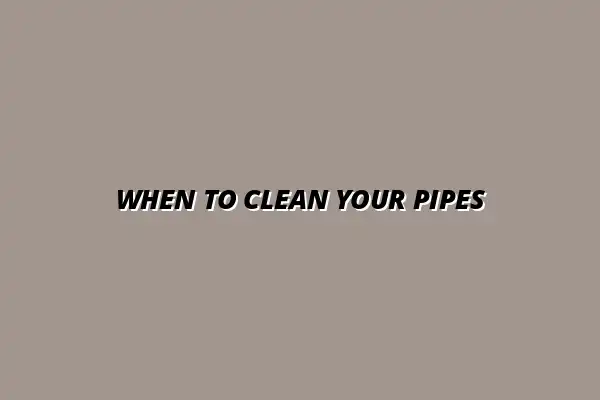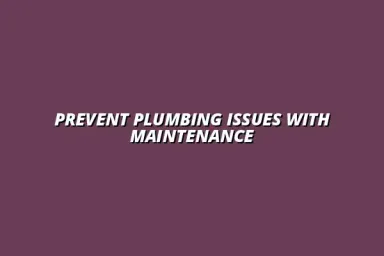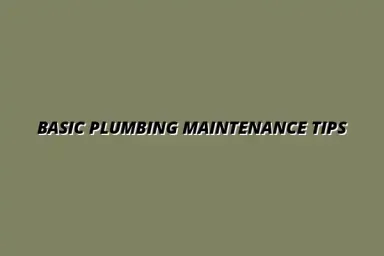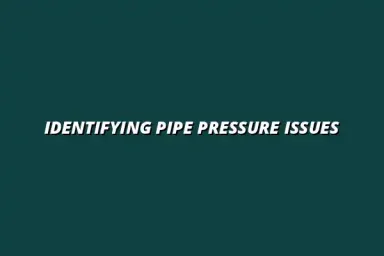Understanding the Importance of Pipe Cleaning
Pipe cleaning is more than just a chore; it's essential for maintaining your home's plumbing system. Regular cleaning helps prevent clogs and ensures that water flows freely through your pipes. By understanding the importance of pipe cleaning, you can extend the life of your plumbing and avoid costly repairs!
It's important to recognize that pipes accumulate debris over time. Things like grease, hair, and mineral deposits can build up, causing blockages. That's why knowing how to clean your pipes effectively is crucial for any homeowner. For helpful tips on maintaining your bathroom plumbing pipes, check out this guide: Maintain Your Bathroom Plumbing Pipes.
What Does Pipe Cleaning Involve?
Pipe cleaning is a process that involves removing debris and buildup from your plumbing system. This can be done through various methods, depending on the severity of the blockage. Understanding what pipe cleaning entails can help you maintain a healthy plumbing system.
Typically, pipe cleaning involves:
- Inspection of pipes to identify issues.
- Removing any visible obstructions.
- Utilizing specialized tools to clear clogs.
- Flushing pipes with water or cleaning solutions.
Techniques Used in Pipe Cleaning
There are several techniques that professionals and homeowners can use for effective pipe cleaning. Some common methods include:
- Hydro Jetting: A powerful method that uses high-pressure water to clear blockages.
- Snaking: A flexible tool that can reach deep into pipes to remove clogs.
- Chemical Cleaners: Special solutions that break down grease and buildup.
Choosing the right technique often depends on the type of blockage and the specific needs of your plumbing system. Regular water pipe cleaning is key to preventing major issues; find helpful tips here: Regular Water Pipe Cleaning Tips. Each method has its benefits and can be effective when used correctly.
Common Tools for Effective Pipe Cleaning
Having the right tools can make pipe cleaning much easier! Some common tools that are useful for this task include:
- Plumbing Snake: Perfect for reaching deep clogs.
- Drain Auger: A heavy-duty tool for tough blockages.
- Hydro Jetting Equipment: Typically used by professionals for thorough cleaning.
- Pipe Inspection Cameras: These help identify hidden issues within your pipes. Learn more about detecting hidden pipe leaks at home with this resource: Detecting Hidden Pipe Leaks at Home.
Using the right tools not only speeds up the process but also ensures a thorough cleaning, which is vital for maintaining your plumbing system.
Signs Your Pipes Need Cleaning
Noticing signs that your pipes need cleaning can save you from bigger plumbing problems down the line. It’s essential to be aware of the common indicators that suggest it’s time for a cleaning. Early intervention can often prevent more serious issues!
Some key signs that your pipes may need attention include:
- Slow draining sinks or tubs.
- Frequent clogs.
- Unpleasant odors coming from drains.
- Water backing up in sinks or toilets.
If you observe any of these signs, it’s a good idea to investigate further to avoid more serious plumbing issues! For instance, learn how to easily clean your kitchen drain lines here: Clean Kitchen Drain Lines Easily.
Identifying Clogs and Blockages
Identifying clogs is crucial for effective pipe cleaning. You might notice that water drains slower than usual or that your toilet takes longer to flush. These are clear indicators of blockages that need immediate attention. Preventing bathroom sink clogs is crucial; this guide helps: Prevent Bathroom Sink Pipe Clogs.
To effectively identify clogs, look for:
- Gurgling noises from drains.
- Water pooling around fixtures.
- Unpleasant smells coming from sinks or shower drains.
Being vigilant about these signs can help you address blockages before they worsen!
Recognizing Unpleasant Odors
Unpleasant odors can be one of the most obvious signs that your pipes need cleaning. These smells often arise from trapped food, grease, or stagnant water within your plumbing. Ignoring these odors can lead to bigger problems.
If you notice bad smells, consider checking for:
- Blocked drainage systems.
- Standing water in sinks or toilets.
- Leaks that may cause mold growth.
Addressing these odors quickly can help maintain a healthy home environment!
Answering Common Questions about Pipe Cleaning
Pipe cleaning is an often-overlooked part of home maintenance, and many homeowners have questions about its importance. Understanding the risks of neglecting pipe cleaning can help you appreciate the need for regular maintenance. It's crucial to be informed, as this knowledge can save you money and hassle in the long run!
What Are the Risks of Neglecting Pipe Cleaning?
When pipes are neglected, they can face several risks, leading to significant problems down the line. One of the main consequences is potential damage to your plumbing system. Over time, clogs can escalate, leading to unexpected leaks or even burst pipes! These situations can be both frustrating and costly to repair.
Potential Damage to Your Plumbing System
Ignoring pipe cleaning can lead to various types of damage, such as:
- Corrosion: Accumulated debris can cause pipes to corrode, shortening their lifespan.
- Increased Pressure: Blockages can create pressure build-up, risking pipe ruptures.
- Water Damage: Leaks from untreated pipes can damage walls, ceilings, and flooring.
It's evident that regular maintenance can prevent these issues, saving you from costly repairs and disruptions. For professional help, consider a plumber in Alcester, Birmingham: Plumber in Alcester, Birmingham.
Health Risks Associated with Poor Pipe Maintenance
Poor pipe maintenance also poses health risks that shouldn't be ignored. When pipes are clogged or dirty, they can harbor bacteria and mold, which can contaminate the water supply. This situation could lead to:
- Health Issues: Contaminated water can cause gastrointestinal problems and other health issues.
- Unpleasant Odors: Stagnant water and waste can create foul smells, uncomfortable for anyone in the home.
- Allergies: Mold growth from damp conditions can trigger allergies and respiratory problems.
By regularly cleaning your pipes, you not only protect your plumbing but also safeguard your family's health. Cleaning your water heater regularly is also important; find out how here: Clean Your Water Heater Easily.
How to Choose the Right Pipe Cleaning Service
When it's time to hire a professional for pipe cleaning, knowing how to choose the right service is essential. A qualified plumber can make a significant difference in ensuring your plumbing system runs smoothly. Below are some key points to consider when selecting a pipe cleaning service.
What to Look for in Professional Plumbing Services
To find a reputable plumbing service, keep an eye out for these qualities:
- Experience: Look for companies with a proven track record in pipe cleaning.
- Licenses and Insurance: Make sure the service is licensed and insured for your protection.
- Transparency: A trustworthy service will provide clear pricing and explanations of their methods.
These factors can help you feel confident in your choice, ensuring the best care for your pipes!
Importance of Reviews and Recommendations
Reviews and recommendations can be invaluable when searching for a pipe cleaning service. Consider these tips:
- Online Reviews: Check platforms like Google and Yelp for customer feedback.
- Word of Mouth: Ask friends or family for recommendations based on their own experiences.
- Social Media: Explore local community groups for insights into reputable services.
Gathering this information can lead you to a reliable service that meets your needs!
Final Thoughts on Pipe Maintenance and Cleaning
Establishing a regular pipe maintenance schedule is the key to avoiding future problems. Integrating pipe cleaning into your home maintenance routine ensures that your plumbing system remains in optimal condition. Plus, it saves you time and money in the long run!
Creating a Pipe Maintenance Schedule
To create an effective maintenance schedule, consider incorporating the following:
- Monthly Checks: Inspect your pipes for any issues or signs of wear.
- Seasonal Cleanings: Schedule thorough cleanings at the beginning of each season.
- Professional Inspections: Arrange for a professional to examine your pipes annually.
By following these steps, you'll help ensure your plumbing system stays in great shape!
Integrating Pipe Cleaning into Your Home Maintenance Routine
Pipe cleaning shouldn't feel like a chore; instead, make it a part of your ongoing home maintenance. For instance, you can:
- Pair Your Cleanings: Schedule pipe cleaning alongside other home maintenance tasks.
- Set Reminders: Use your phone or calendar to remind you of upcoming pipe maintenance.
- Educate Your Family: Teach family members about the importance of maintaining the plumbing system.
This proactive approach can create a cleaner, healthier home environment.
Using Technology for Pipe Maintenance Monitoring
Technology can play a big role in keeping your pipes in check! Here are some ways to use it:
- Smart Water Sensors: Install sensors that alert you to leaks or unusual water usage.
- Apps: Use home maintenance apps to track your cleaning schedule and reminders.
- Video Monitoring: Some services offer video inspections to check the condition of your pipes.
By embracing technology, you can stay ahead of potential issues and maintain your plumbing system effectively!
Encouraging Proactive Home Maintenance Practices
Encouraging proactive home maintenance practices is essential for preserving your plumbing system. Educating family members about proper pipe care can make a world of difference. The more informed everyone is, the better they can contribute to maintaining your home's plumbing!
Educating Family Members on Pipe Care
To promote effective pipe care among family members, consider these methods:
- Hold Informational Sessions: Share knowledge about what can harm pipes, like grease and non-flushable items.
- Assign Responsibilities: Designate tasks related to pipe maintenance, such as cleaning sink traps.
- Encourage Reporting: Teach everyone to report any unusual signs, like bad smells or slow drains.
With everyone on board, caring for your pipes becomes a family effort!
Benefits of Regular Inspections and Maintenance
Investing in regular inspections and maintenance has countless benefits. These include:
- Peace of Mind: Knowing your pipes are in good shape provides comfort.
- Cost Savings: Preventive maintenance can save you big bucks on repairs.
- Enhanced Home Value: A well-maintained plumbing system can add value to your home.
By prioritizing these practices, you're not just protecting your pipes—you're also enhancing your home's overall health!

 Kiran Almasi
Kiran Almasi

